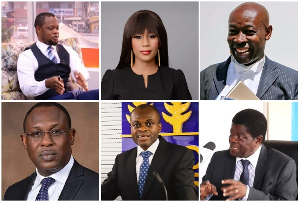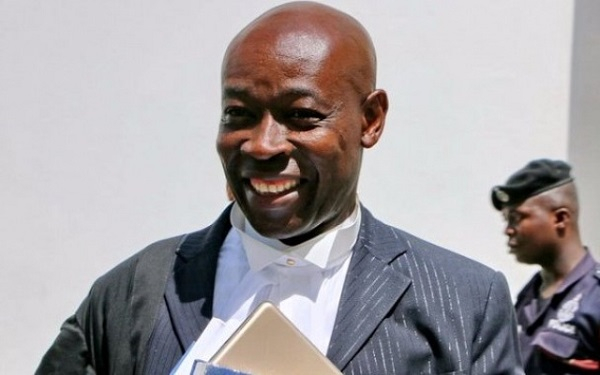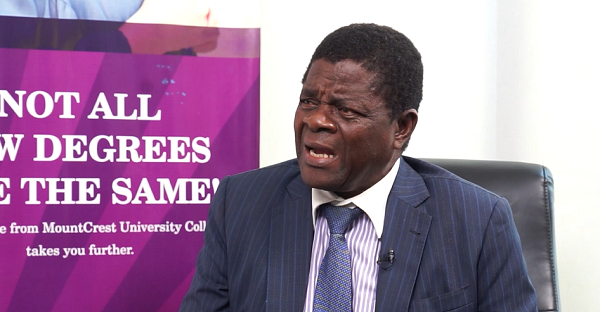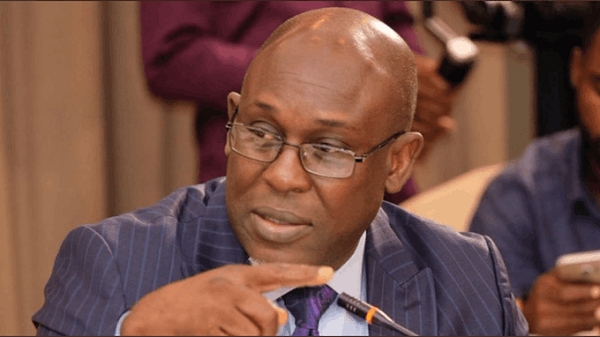 Laywers who have commented on Supreme Court's ruling Alexander Kwamina Afenyo-Markin’s application
Laywers who have commented on Supreme Court's ruling Alexander Kwamina Afenyo-Markin’s application
One may have thought the judgement of the apex court of Ghana, the Supreme Court, on Majority Leader Alexander Kwamina Afenyo-Markin’s application challenging the Speaker of Parliament Alban Bagbin’s vacancy declaration in the House would have brought the current impasse on which political party forms the Majority Caucus to an end.
However, following the release of the full judgement of the Supreme Court on the matter, there seems to be more uncertainty on which party forms the Majority Caucus and which party forms the Minority Caucus.
The Court's interpretation of Article 97 (1)(g) and (h), which touches on the declaration of vacancy in the House, has divided legal opinions.
Even the judgement of the Court has raised different opinions among lawyers, with some saying that it is not an order for Speaker Bagbin to reverse his declaration but a mere opinion of the justices on what the provisions of the Constitution mean.
Here are some of the opinions that have been shared on the Supreme Court judgement:
Justice Srem Sai:

Justice Srem-Sai, a renowned private legal practitioner and law lecturer, has said there was no order in the 109-page ruling of the Supreme Court for the Speaker of Parliament to reverse his vacancy declaration.
Justice Srem-Sai, one of the lawyers of Speaker Bagbin, explained that the judgement of the Court was a mere opinion of the justices on the issues at hand and does not bind the Speaker to take certain actions.
“Advisory opinion (sometimes referred to as ‘declaratory judgment’) is an opinion which merely declares the meaning or the position of law without giving any enforcement or executable orders. The Constitution does not allow the Supreme Court to give declarations without consequential orders or directions. That’s why it is said that the Supreme Court doesn’t give advisory opinions.
"More particularly, Article 2(2) provides as follows: ‘The Supreme Court SHALL, for the purposes of a declaration under Clause (1) of this Article, make such orders and give such directions as it may consider appropriate for giving effect, or enabling effect to be given, to the declaration so made’.
“So, really and truly speaking, the Court did not make any consequential executable/enforceable order. In other words, we each have to decide what to do with the declarations. Now, two things: Firstly, the Plaintiff and his followers have been saying all week that ‘the Speaker must comply’, ‘the Speaker must comply’.
"It appears they will be disappointed. Because, there’s nothing in the judgement requiring the Speaker to comply with anything. Secondly, and perhaps most importantly, it also means that the Supreme Court has now, contrary to longstanding precedent and contrary to the express provision of the Constitution, accepted that it can declare the meaning of the law without making enforcement orders,” he wrote in a post shared on X.
Thaddeus Sory:

Thaddeus Sory, the lead counsel of Speaker Bagbin in the matter, has also corroborated the point made by Justice Srem Sai.
Thaddeus Sory argued in a Facebook post that the original case filed by the Majority Leader and Member of Parliament for Effutu, Alexander Afenyo-Markin, did not include a request to nullify the Speaker's statement as the statement had not been made at the time of the filing.
According to him, the Plaintiff ought to have formally amended his original complaint to include the Speaker's decision if he had indeed wanted the Court to consider that.
He emphasised that the Court, by its ruling, agreed that the Plaintiff did not officially update his case to include the Speaker's decision but still went ahead to consider the new information while the main case remained unchanged.
He emphasised that the Court, by the admission of Justice Asare Darko, who wrote the lead judgment, should not have dealt with the Speaker's statement in the first place as there was no formal cause for action.
On the issue of orders, Thaddeus Sory argued that the final judgment did not declare the Speaker's statement null and void; rather, the Court only disagreed with the Speaker's interpretation of the law but did not issue any orders against the Speaker.
He emphasised that this rendered the Court's earlier grant of a temporary order against the Speaker's ruling as no longer in effect, and there was no final order requiring Parliament to recognise the MPs affected by the Speaker's statement.
Amanda Clinton:

Private legal practitioner Amanda Clinton has also refuted assertions that the ruling of the Court is inconsistent because the constitution of the New Patriotic Party (NPP) in particular, states that any member of the party who contests against the party’s candidate in an election is no longer its member.
She pointed out that while the NPP constitution is to maintain discipline in the party, the 1992 Constitution is supreme, and any matter affecting people's representation in Parliament must comply with it.
“While the NPP has the right to enforce its internal rules regarding membership, the Supreme Court’s ruling underscores the necessity for constitutional adherence and due process in parliamentary matters.
“The Court’s decision highlights that actions affecting parliamentary representation must comply with national constitutional standards, regardless of party policies. Therefore, the ruling is not necessarily hypocritical but rather reflects the distinct legal frameworks governing party membership and parliamentary representation,” she wrote in an editorial sighted by GhanaWeb.
Kwaku Ansah-Asare:

Legal luminary and statesman Kwaku Ansah-Asare, in his reaction to the full ruling in an interview on TV3, reiterated his point that the Supreme Court did not have jurisdiction to hear the matter.
“I still stand by my earlier thought that the Supreme Court did not have the requisite jurisdiction to entertain the matter.”
Ansah-Asare, a former director of the Ghana School of Law, argued that the Supreme Court's intervention was unnecessary, adding that the processes the Plaintiff filed were full of procedural errors that the Court should have seen and thrown out the case.
He also accused Alexander Kwamina Afenyo-Markin and the NPP of hypocrisy because the party has previously sacked its members who decided to go independent or support other persons in an upcoming election.
“The political parties all have Article 97 in their constitutions. For instance, the NPP Constitution Article 3(9)(1) follows closely the wording of Article 97, and on that score, the NPP expelled certain members they found to have crossed the carpet, that is Alan Kyerematen and co. and the press release was signed by Justin Kudah Frimpong, the General Secretary.
“Therefore, I see in this a double standard by Afenyo-Markin. And at the end of this embarrassment, I think that he should apologise to this nation for this needless legal tussle that is costing so much and is taking so much of our time.”
Martin Kpebu:

Renowned private legal practitioner Martin Kpebu has also stated his opposition to the Supreme Court's judgement.
Speaking in an interview on JoyNews, Kpebu asserted that the provisions of Article 97 are very clear, and what the Court did was just to interpret the provisions as they pleased.
“The provision is very clear; what we are confusing in this case is that an undesirable law should be twisted to become the desirable one that we want. No! We don’t write the provision well; that is what we should accept.
“Article 97(1) has not been crafted the way the Supreme Court wants it crafted. So, they have used the interpretation approach to now recraft the Constitution,” he said.
He added, “That is how Tsatsu Tsikata stated that we should be careful because it is not only the military that we can use to overthrow the Constitution, but the judiciary can also overthrow the Constitution.”
Kofi Bentil:

Private legal practitioner and vice president of IMANI Africa, Kofi Bentil, voiced his support for the ruling of the Supreme Court.
He said that the Supreme Court was right because Article 97 does not apply to MPs who change their political affiliation to contest in elections for a future parliament.
He pointed out that the Court’s ruling affirms that only legislators who change their political affiliations to enter the same parliament on the ticket of a different party should lose their seats.
“What the Supreme Court is saying is that Cynthia Morrison (one of the MPs whose seat was declared vacant) has not declared that she has left the NPP... you are dealing with issues of constitutional interpretation affecting the life of parliament.
“To say that somebody is standing in Gomoa somewhere and is campaigning, and because of that, the Constitution should be interpreted differently and the life of Parliament should be affected in a certain way, it doesn’t wash,” he said in an interview on JoyNews.
He added, “People have a right to campaign or associate differently and come into the next Parliament. But today as we speak, has Cynthia Morrison told you that I’m no longer a member of the NPP?”
BAI/OGB
Watch George Ayisi’s interview with Adam Bonaa on the recent unrest in Bawku below:
You can watch today's compilation of the Twi news below: